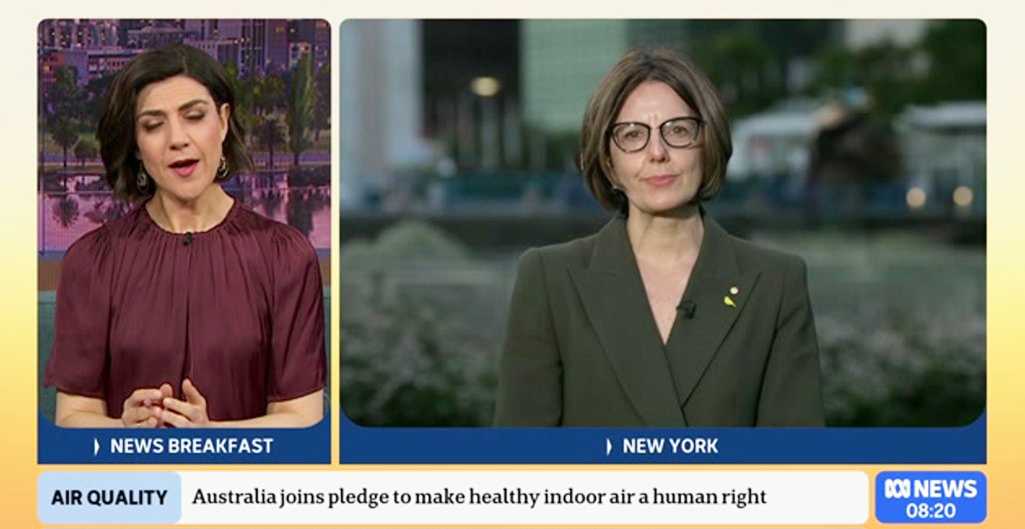
This is a transcript of an interview on 24 September 2025 AEST between ABC TV News Breakfast program host Emma Rebellato and the Academy's Chief Executive Anna-Maria Arabia at United Nations Headquarters
Emma Rebellato: Let's head back to New York now, where Australian scientists are today helping lead a charge at the UN to make healthy indoor air a human right. We're joined by the Chief Executive of the Australian Australian Academy of Science. Thanks for joining us.
Anna-Maria Arabia: Good morning, Australia. It's lovely to be with you, Emma.
Emma Rebellato: Tell me what prompted this move.
Anna-Maria Arabia: There have been so many advocates, professional scientists from around the globe who have been working for years to advance clean indoor air. They have come together at the UN General Assembly in this global movement to declare indoor air quality, or clean indoor air, a basic human right.
We're doing it because we spend 90% of our time indoors and yet we do not monitor or measure the quality of the air, but we do monitor the air that we breathe outdoors, the food we eat, and the water we drink. Where we spend most of our time, we have no idea about the the quality of the air that we breathe.
Emma Rebellato: Are there particular areas, countries, specific things, buildings that make indoor air quality bad?
Anna-Maria Arabia: Yes, poor indoor air quality affects every one of us in every country of the world. Think for a moment, the COVID-19 pandemic showed us that viral transmission, SARS-COV2 was airborne.
Think about vehicles that enter indoor spaces, transmission in childcare centres, hospitals, in workplaces across Australia, and think for a moment in developing countries where people are cooking with very poor sources of energy, often that's women cooking, and are breathing in poor pollutants every single day. It's an issue that affects every one of us and it's time that we declare clean indoor air a basic human right.
Emma Rebellato: If this declared a basic human right, what will that do? What will change?
Anna-Maria Arabia: Well, we would be monitoring clean indoor air. The science of indoor air quality is very well understood. There's basic things we can measure, CO2, PM.2, we can ensure our ventilation rates are excellent, so the air I'm breathing isn't coming out of someone else's lungs and vice versa.
We can apply technology that exists today. Some of that technology is really simple and straightforward, and other technology we know is really effective. For example, in aged care qualities, in some parts of Australia, we're trialling UV light to kill viral transmission, really simple technology, that can be implemented today.
We would see better health, we would see lower absenteeism and better productivity across the nation. If we did just those things, the economic benefits in health and productivity in Australia lone would be $20 billion annually in perpetuity.
Emma Rebellato: So those are the benefits. What are the consequences and the health impacts, economic impacts, of poor indoor air quality?
Anna-Maria Arabia: So, when we're not breathing clean indoor air, we're seeing cognitive function decline, we're seeing poor performance by workers, students, there's good evidence to support this, strong evidence to support this.
When viruses spread, we see absenteeism and therefore productivity goes down. That's common in workplaces across Australia. Then if you think of the longer-term impacts in terms of respiratory illness, asthma, and impacts on cardiovascular disease and every part of the body. Science has shown us poor indoor air quality reduces our health and has consequences, in some countries in survival, but in performance overall.
Emma Rebellato: Thank you very much for joining us, we'll be watching what happens at the UN with this one.
Anna-Maria Arabia: It's a pleasure to be with you.






